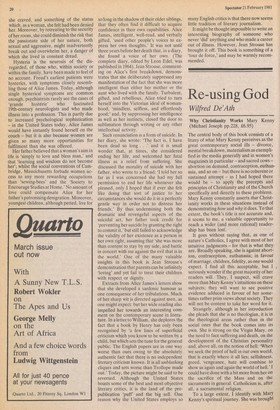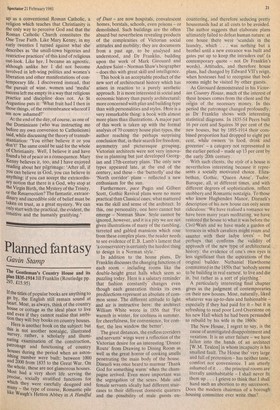Re-using God
Wilfred De'Ath
Why Christianity Works Mary Kenny (Michael Joseph pp.228, 16.95) The central body of this book consists of a litany of what Mary Kenny perceives as the great contemporary social ills ŌĆö divorce, mental breakdown, materialism as exemplified in the media generally and in women's magazines in particular ŌĆö and sacred cows ŌĆö abortion on demand, contraception, euthanasia, and so on ŌĆö but there is no coherent or sustained attempt ŌĆö as I had hoped there would be ŌĆö to apply the precepts and principles of Christianity and of the Church specifically and directly to these problems. Mary Kenny constantly asserts that Christianity works in these situations instead of demonstrating how and why it does. To that extent, the book's title is not accurate and, it seems to me, a valuable opportunity to reach a wider (and more rational) readership has been lost.
It goes without saying that, as one of nature's Catholics, I agree with most of her intuitive judgments ŌĆö for that is what they are. Broadly speaking, she is against abortion, contraception, euthanasia; in favour of marriage, children, fidelity, as one would expect. I find all this acceptable, but I I seriously wonder if the great majority of her readers will. They, I suspect, will crave more than Mary Kenny's intuitions on these subjects; they will want to see positive evidence adduced in favour of her sometimes rather prim views about society. They will not be content to take her word for it.
Strangely, although in her introduction she pleads that she is no theologian, it is in the theological areas rather than in the social ones that the book comes into its own. She is strong on the Virgin Mary, on the need to face suffering and death, on the development of the Christian personality and, above all, on the notion of hell: 'When we seek the proof of hell in our own world, that is exactly where it all lies; selfishness, greed, vengeance, hate will combine to show us again and again the world of hell.' I could have done with a bit more from her on the sacrifice of the Mass and on the sacraments in general. Catholicism is, after all, a sacramental religion. To a large extent, I identify with Mary Kenny's spiritual journey. She was brought up as a conventional Roman Catholic, a religion which teaches that Christianity is the only way to perceive God and that the Roman Catholic Church constitutes the One True Faith. Like Mary Kenny, in my early twenties I turned against what she describes as 'the small-town bigotries and restrictive practices' of this kind of religious out-look. Like her, I became an agnostic, although unlike her I did not become involved in left-wing politics and women's liberation and other manifestations of contemporary life. I discovered instead, that the pursuit of wine, women and 'media' success left me empty in a way that religious Practice and discipline does not. As St Augustine puts it: 'What fruit had I then in those things, of the remembrance whereof I am now ashamed?'
At the end of the day, of course, as one of the Dominicans (who was instructing me before my own conversion to Catholicism) said, while discussing the theory of transubstantiation: 'You either believe it or you don't!' The same could be said for the whole of Christianity. Well, I believe it and have found a bit of peace as a consequence. Mary Kenny believes it, too, and I have enjoyed reading about her pilgrimage: 'After all, if You can believe in God, you can believe in anything: if you can accept the extraordinary notion that there is a God, why stop at the Virgin Birth, the Mystery of the Trinity, or the Resurrection? The fantastic, extraordinary and incredible side of belief must be taken on trust, as a great mystery. We can ?lily start with the practical, the evident, the intuitive and the humanly gratifying.'







































 Previous page
Previous page